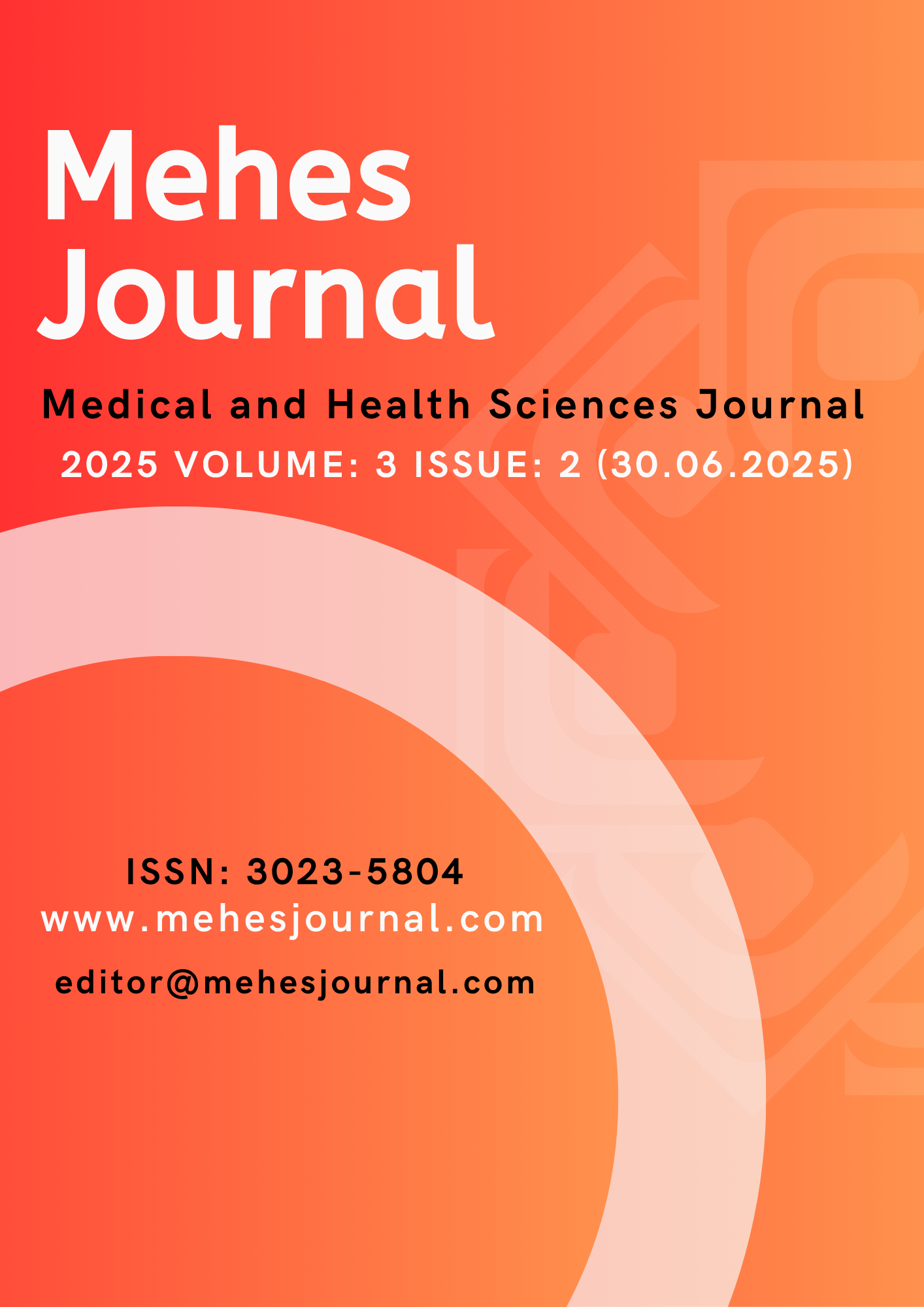Retropharyngeal Abscess with Neurological Presentation: Diagnostic Challenge in a Hearing-Impaired Patient
DOI:
https://doi.org/10.5281/zenodo.15775488Keywords:
Retropharyngeal Abscess, Hearing Loss, Neck, Infections, Neurologic ManifestationsAbstract
Objective: The aim of this study is to present a case of retropharyngeal abscess in an elderly male patient with comorbidities of congenital hearing loss and uncontrolled diabetes mellitus, and to clinically evaluate the unusual neurological symptomatology with which this infection presented. Our study emphasizes the diagnostic challenges encountered in deep neck infections and the necessity of multidisciplinary evaluation, particularly in patient populations with sensory deficits.
Material and Methods: Our case involves a male patient approaching sixty years of age who presented to our clinic with cephalgia developing over approximately thirty days and a progressive pain syndrome that had intensified over the past five days. The patient's history was notable for paresthesia complaints in the right extremities. The patient's past medical history included congenital hearing deficit and a twenty-year history of type 2 diabetes mellitus. Clinical examination revealed vital parameters within normal limits, while biochemical analyses demonstrated elevated inflammatory markers (CRP: 21.6 mg/L, WBC: 12,700/μL). Advanced imaging modalities performed to exclude neurovascular pathologies revealed an abscess formation measuring 10×15×16 mm in the right retropharyngeal space. Otolaryngology consultation identified edema in supraglottic structures and restricted ipsilateral vocal cord mobility.
Discussion and Conclusion: The presented case demonstrates that the etiology of retropharyngeal abscess may deviate from conventional clinical presentation and can be masked by neurological symptoms. Diabetes mellitus plays a critical role in the progression of infectious processes due to immune system impairment and microvasculatory compromise. In patient populations with hearing impairment, communication barriers during history-taking and limitations in subjective symptom assessment increase the importance of objective diagnostic approaches. Contrast-enhanced computed tomography of the neck is considered the gold standard for retropharyngeal abscess diagnosis and is of vital importance in early diagnostic approaches. In conclusion, in patient populations with high comorbidity burden, maintaining a high clinical suspicion index and implementing comprehensive imaging protocols in the face of atypical presentations play a key role in reducing morbidity and mortality. This case emphasizes the importance of multidisciplinary approach and early intervention in achieving successful outcomes.
References
Almuqamam M, Gonzalez FJ, Sharma S, Kondamudi NP. Deep Neck Infections. In: StatPearls. Treasure Island (FL): StatPearls Publishing; 2024.
Boscolo-Rizzo P, Marchiori C, Montolli F, et al. Deep neck infections: a constant challenge. ORL J Otorhinolaryngol Relat Spec. 2006;68(5):259-65.
Garvey EA, Jamil TL, Levi JR, Cohen MB. Demographic disparities in children with retropharyngeal and parapharyngeal abscesses. Am J Otolaryngol. 2024;45(2):104140.
Ridder GJ, Technau-Ihling K, Sander A, et al. Spectrum and management of deep neck space infections: an 8-year experience of 234 cases. Otolaryngol Head Neck Surg. 2005;133(5):709-14.
Huang TT, Liu TC, Chen PR, et al. Deep neck infection: analysis of 185 cases. Head Neck. 2004;26(10):854-60.
Retropharyngeal abscess in diabetic patient: Management challenge. ECE2023, 25th European Congress of Endocrinology. Endocrine Abstracts. 2023.
Jayagandhi S, Cheruvu SC, Manimaran V, Mohanty S. Deep Neck Space Infection: Study of 52 Cases. Indian J Otolaryngol Head Neck Surg. 2019;71(Suppl 1):923-6.
Parhiscar A, Har-El G. Deep neck abscess: a retrospective review of 210 cases. Ann Otol Rhinol Laryngol. 2001;110(11):1051-4.
Harkani A, Hassani R, Ziad T, et al. Retropharyngeal abscess in adults: five case reports and review of the literature. ScientificWorldJournal. 2011;11:1623-9.
Kicking off a Retropharyngeal Abscess. Irish Medical Journal. 2019;112(5):933.
Casqueiro J, Casqueiro J, Alves C. Infections in patients with diabetes mellitus: A review of pathogenesis. Indian J Endocrinol Metab. 2012;16(Suppl1):S27-36.
Wu CL, Tsai MS, Lee TJ, et al. Type 2 Diabetes Mellitus Increases Peritonsillar Abscess Susceptibility: Real-World Evidence. Clin Exp Otorhinolaryngol. 2021 Aug;14(3):347-354.
Chang JS, Yoo KH, Yoon SH, et al. Predisposing factors of complicated deep neck infection: 12-year experience at a single institution. J Korean Med Sci. 2013;28(1):80-5.
Barnett S. Communication with deaf and hard-of-hearing people: a guide for medical education. Acad Med. 2002;77(7):694-700.
The Clinical View on Streptococcus anginosus Group – Opportunistic Pathogens Coming Out of Hiding. Frontiers in Microbiology. 2022;13:956677.
From Normal Flora to Brain Abscesses: A Review of Streptococcus intermedius. Frontiers in Microbiology. 2020;11:826.
Duval M, Daniel SJ. Retropharyngeal and parapharyngeal abscesses in children. Laryngoscope. 2023;133(4):952-8.
Grisaru-Soen G, Komisar O, Aizenstein O, et al. Retropharyngeal and parapharyngeal abscess in children--epidemiology, clinical features and treatment. Int J Pediatr Otorhinolaryngol. 2010;74(9):1016-20
Downloads
Published
How to Cite
Issue
Section
License
Copyright (c) 2025 MEHES JOURNAL

This work is licensed under a Creative Commons Attribution 4.0 International License.










